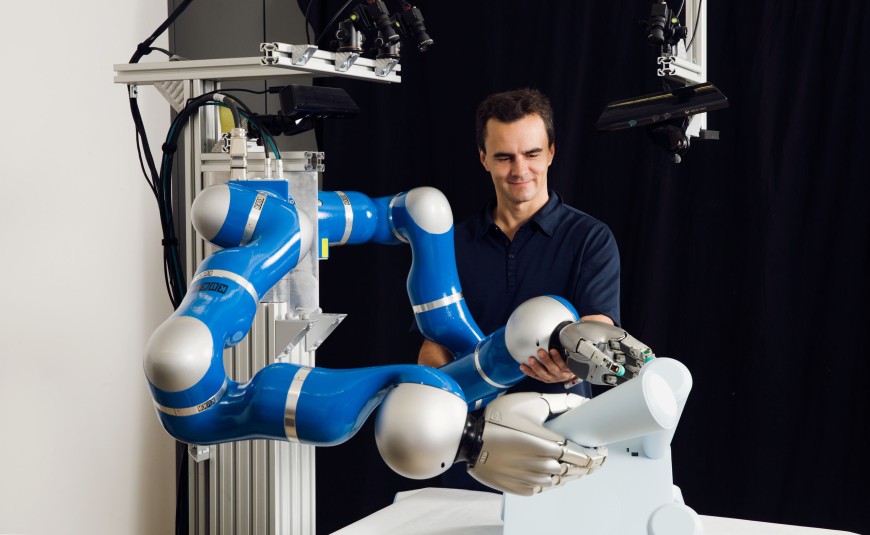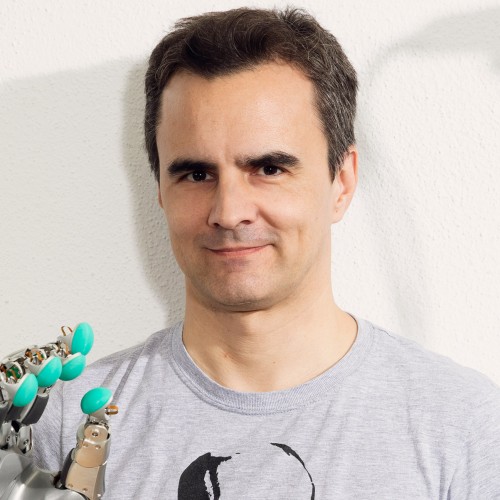First EIC Transition Grant awarded to TU Darmstadt
“Visual robot programming” project receives funding of more than one million euros
2022/03/18
For its new Transition Grant program, the European Innovation Council (EIC) has for the first time selected 42 projects from 292 proposals to receive a total of €99 million in EU funding. The very first Transition Grant goes with the highest possible score to computer science professor Jan Peters and his team at the Intelligent Autonomous Systems Group. For their pioneering project “Visual Robot Programming”, the team will receive funding of over 1 million euros over two years.

The aim of the project is to bring the novel technology of visual robot programming (VRP) to market by 2024. VRP makes it possible to programme robots solely through gestures, without writing a single line of code. With this intuitive technology, workers can teach industrial robots with no prior knowledge of robotics and minimal training.
“Current industrial robots are designed to repeat the same task over and over again. This makes them great for mass production of a single product by the millions, but not for the small-scale mass production required by small and medium-sized enterprises (SMEs),” explains team member Suman Pal.
To enable SMEs to benefit from automation, the AI-powered VRP enables real-time gesture-based robot programming: users show the desired movement with hand gestures, and the industrial robot follows and imitates the movement identically and in real time.
Professor Jan Peters, Ph.D.,
Intelligent Autonomous Systems Group
Visual robot programming unlocks new automation potential in the SME segment and enables workers to shift to higher-skilled and more rewarding tasks.

The EIC funding will enable the team of Professor Peters to further develop the current state of the technology and test it in realistic industrial environments. At the end of the project, the scientists want to commercialise the visual robot programming through their spin-off company Telekinesis. The project is based, among other things, on the results of the ERC Proof of Concept project “AssemblySkills” , the FET Open project GOAL-Robots from the Horizon 2020 programme, and the TU Darmstadt Pioneer Fund Project “Robot Learning from Demonstration” .
EIC Transition Grant
This new programme aims to transform research results from EIC Pathfinder pilot projects and European Research Council (ERC) proof-of-concept projects into commercially viable businesses. This involves validating the technologies in real-world environments and creating the business case for bringing the innovations to market. It was developed in a partnership between the EIC and the ERC with advice from members of the ERC Scientific Council and the EIC Pilot Advisory Board.
Spin-off Telekinesis – building the next generation of robots
The vision of Telekinesis is to democratize robotics by empowering every individual to teach robots with their no-code VRP technology. The spinoff will be led by the three founders Suman Pal, Arjun Vir Datta, and Mohammed Safiulla Dadabai, with Prof. Jan Peters, Ph.D. acting as the lead technical advisor. Telekinesis will continue its strong collaboration with the Intelligent Autonomous Systems (IAS) group to pioneer ground-breaking robotics and machine learning research and transfer innovative AI technologies to the industry
Department of Computer Science
